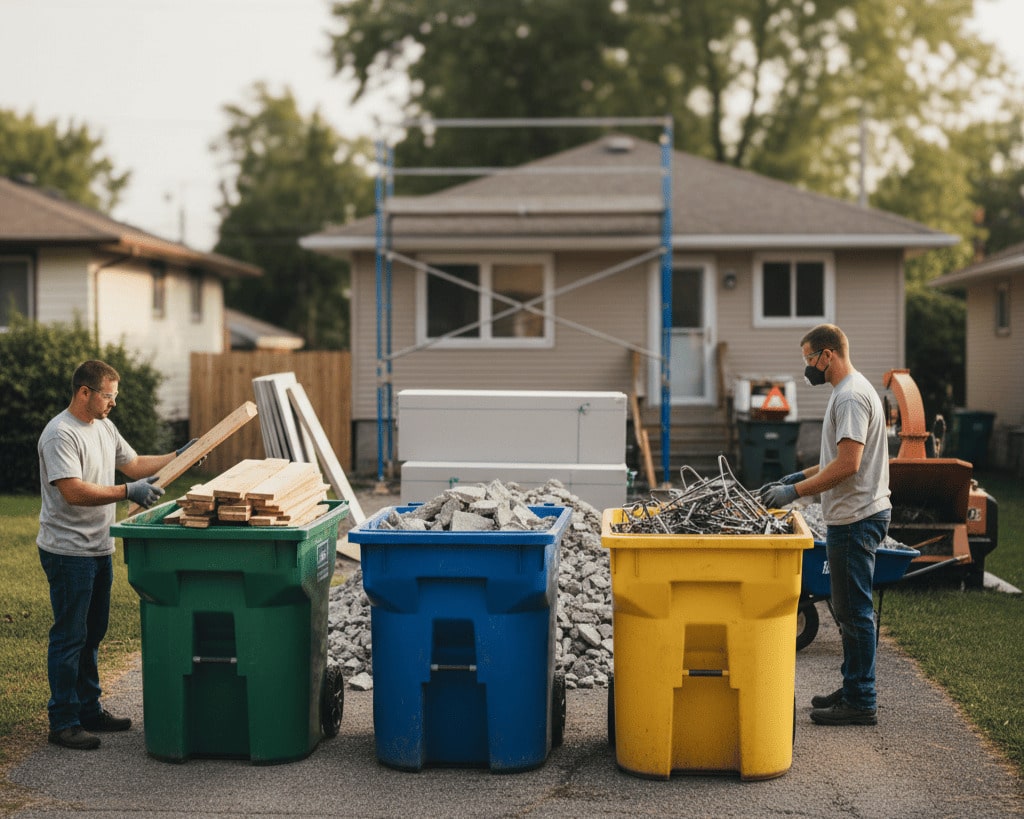Construction projects generate a lot of material, some of it reusable, some recyclable, and some that need special handling.
Construction material recycling turns demolition, renovation, and build-off waste into useful resources, reduces landfill use, and lowers the environmental impact of building work. This guide explains what Winnipeg homeowners and small contractors need to know: which construction materials are commonly recycled, where to take them in Winnipeg, how to plan on-site separation, and how Mr Garbage helps make recycling practical and compliant.
I include local references, Canadian context, and practical steps you can apply to a garage remodel, kitchen renovation, deck teardown, or small demolition. When you’re ready to book pickup or a bin for a renovation project, Mr Garbage can deliver, sort, and route materials to the right local facilities.
Why construction material recycling matters
Construction material recycling reduces the demand for virgin materials and the volume sent to landfill. It also lowers greenhouse-gas emissions tied to extraction and manufacturing, and creates feedstock for local producers that can use crushed concrete, reclaimed lumber, metals, and other materials.
Across Canada, the non-residential sector (which includes construction) accounts for a large share of disposed waste. National reporting shows diversion efforts have improved, but non-residential sources still contribute substantially to landfill tonnage, making construction material recycling a priority for provincial and municipal policy.
What counts as construction material recycling
When we say construction material recycling, we mean the capture and processing of commonly generated C&D materials so they re-enter the economy. Typical streams include:
- Concrete and masonry: crushed and used as aggregate or road base.
- Clean wood and dimensional lumber: for reuse, chipping, or wood-fuel processing.
- Metals (steel, copper, aluminum): sorted and sent to scrap metal processors for remelting.
- Drywall (gypsum): can be recycled into soil amendments or reused in manufacturing, where accepted.
- Asphalt and roofing materials: reclaimed and reused in paving or manufacturing.
- Glass, brick, tiles, and ceramics: reused or processed for aggregate.
- Insulation and cardboard/paper: diverted where facilities accept them.
Not every facility accepts every stream; the local network of depots, private yards, and processors determines what is practical to recycle in Winnipeg.
Where to recycle construction materials in Winnipeg
Planning where materials will go before demolition starts saves time and prevents contamination.
4R Winnipeg Depots and Brady Road
Winnipeg operates multiple 4R depots for residents, and the Brady Road Resource Management Facility is the city’s main hub for managing larger flows. Some renovation materials clean concrete, brick, tiles, unpainted lumber, clean fill, and scrap metal, are accepted at depot locations. Check depot lists before you haul to confirm acceptance and any preparation rules.
City of WinnipegPrivate C&D recyclers and yards
Winnipeg also has private processors that focus on specific streams. For example, local recyclers accept and process concrete into aggregate or specialize in scrap metal recovery and wood chipping. Using these yards is often the fastest route for larger contractor loads and for materials that depots cannot accept in bulk. Rakowski Recycling is one example of a local facility that manages concrete and other construction materials.
Rakowski GroupSpecialized routes: drywall, asphalt, and hazardous components
Some materials need dedicated processors. Gypsum recycling and asphalt reclamation facilities accept large quantities but require clean streams. Hazardous components (asbestos, lead-based paint residues, PCB-containing ballasts) must be identified, separated, and handled under provincial hazardous-waste rules. See Manitoba’s guidance for managing demolition debris that may contain hazardous waste. Planning and testing before demolition reduces risk and cost.
gov.mb.caConstruction material recycling: on-site best practices
Successful recycling starts on site. These practical habits cut contamination and increase diversion:
Separate streams from day one (construction material recycling)
Create clear collection zones onsite for concrete, clean wood, metals, gypsum, roofing, and general waste. Label bins or roll-offs and keep paths between zones tidy. Workers must know which materials go where to avoid cross-contamination.
Keep materials clean and sorted.
Dirty or wet loads are harder to recycle. Rinse paint-splattered metal, strip painted or treated wood where feasible, and keep soil out of clean aggregate loads. A small amount of contamination can cause an entire load to be rejected.
Pre-demolition surveys and hazardous checks
Before you demo, review building history and inspect for asbestos, lead, PCBs, and other hazards. Manitoba requires generators to identify hazardous debris. Arrange abatement with licensed contractors if hazardous materials are present.
Working with Mr Garbage for construction material recycling
Mr Garbage helps homeowners and small contractors keep recycling practical:
- Project assessment: Send photos or arrange a quick site visit. We’ll recommend container types and a separation plan.
- Bin delivery and staged pickups: We deliver bins for specific streams, metals, clean wood, and general construction waste, and schedule staged pickups to avoid mixing loads.
- Routing to local processors: We route concrete to local crushers, metals to scrap yards, and clean wood to chippers or reuse partners. When hazardous materials are suspected, we coordinate with licensed carriers and abatement specialists.
- Donation and salvage coordination: Usable doors, fixtures, or cabinetry are set aside for donation or resale where appropriate.
Working with a local hauler that knows Winnipeg processors and depot rules reduces load rejections and keeps your project on schedule.
Handling hazardous materials and regulated wastes
Construction projects often uncover regulated materials. Manitoba’s guide on managing demolition debris explains a generator’s duties: identify hazardous contents, register when required, and use licensed carriers and receivers for hazardous wastes. Common hazardous items include asbestos-containing materials, mercury switches, PCB ballasts, and certain paints and solvents.
If you find suspect materials, stop work in that area, isolate the material, and call professionals. Mr Garbage will help you arrange licensed removal and ensure compliant documentation for transport and final treatment. This prevents unsafe handling and legal exposure.
Reuse first: salvaging materials for local projects.
Before recycling, think reuse: many construction materials can be salvaged in good condition and reused with minimal processing. Salvage options include:
- Doors, windows, and trim: Often reusable after light refurbishment.
- Cabinetry and fixtures: Donation partners and local reuse stores accept serviceable items.
- Bricks and stone: Cleaned and reused in landscaping or new builds.
- Dimensional lumber: Reclaimed timber can be repurposed for furniture or new framing.
Reusing materials keeps embodied energy in the built environment and provides cost-effective sources for homeowners doing repairs or DIY projects.
Local examples: construction material recycling in Winnipeg projects
Small renovation: River Heights
A homeowner replacing a kitchen countertop separated metal frames, cabinetry (donatable), and inert tile. Mr Garbage collected the metal and took it to a local scrap yard, arranged donation pickup for usable cabinets, and transported tiles to a depot that accepts ceramic and porcelain for recycling. The project avoided unnecessary landfill and salvaged useful materials.
Deck teardown: St. Boniface
A deck removal produced large volumes of clean lumber and fasteners. The team pre-sorted untreated lumber for chipping and reclaimed usable boards for donation. Metal fasteners and hardware were separated and routed to a scrap metal yard. The homeowner reused some of the reclaimed boards for garden beds. These on-site separation habits kept the majority of the material out of the landfill.
These examples show how routine separation and local routing make recycling accessible even for homeowner-sized projects.
Policy, targets, and the future of construction material recycling
Manitoba and municipal efforts are aiming to improve C&D material diversion. Studies and task forces in the province have highlighted the opportunity to expand recycling infrastructure and adopt best practices that keep value in the local economy. National reports also emphasize that the C&D sector is critical to Canada’s circular-economy goals; improved diversion in this sector will yield meaningful environmental and economic benefits.
meia.mb.caCommon mistakes and how to avoid them
Avoid these frequent problems that lead to rejected loads or extra cost:
- Mixing hazardous materials with recyclables. Always isolate suspect items and call a professional. gov.mb.ca
- Allowing soil and organic matter into clean aggregate or wood loads. Clean separation matters.
- Assuming all depots accept every material. Check local depot acceptance lists before hauling. City of Winnipeg
- Failing to pre-plan for bulky or heavy streams. Arrange staged pickups and use local processors with capacity for concrete or asphalt.
A short pre-project plan and a conversation with Mr Garbage will avoid these pitfalls.
How to estimate what you’ll need (planning your pickup and bins)
Start by walking the site and identifying main streams: concrete, metal, wood, drywall, and mixed waste. Photograph the pile and note access points. Mr Garbage can use photos to recommend the type and number of containers and to suggest staged pickups so streams remain separated.
Good planning shortens cleanup time, reduces truck trips, and increases the chance your material is recycled rather than landfilled.
Conclusion
Construction material recycling is practical, accessible, and good for Winnipeg’s local economy and environment. Whether you’re a homeowner doing a kitchen remodel or a small contractor managing a tear-out, simple on-site separation, pre-demolition checks for hazardous materials, and partnering with a local hauler will keep valuable materials in the resource loop.
Mr Garbage helps homeowners and contractors with bin delivery, staged pickups, salvage coordination, and routing to approved local processors and 4R depots. If you want to plan recycling into your next renovation or demolition, call Mr Garbage at
(204) 999-5865 or visit
https://mrgarbage.ca/ to schedule an assessment and get a practical recycling plan. Let us handle logistics so your project runs cleanly and responsibly.
Frequently Asked Questions (FAQs)
Q1: What construction materials can be recycled in Winnipeg?
A1: Commonly recycled materials include concrete, brick, clean wood, metals, drywall (where accepted), roofing asphalt, tiles, and some glass and ceramics. Acceptance varies by facility; check depot and processor lists before hauling.
Q2: Where can I recycle concrete and masonry in Winnipeg?
A2: Local concrete recyclers and certain 4R depot locations accept clean concrete and masonry for crushing into aggregate. Private yards that specialize in concrete recycling are often the best option for large volumes.
Q3: What should I do if I find suspected asbestos or lead paint during demolition?
A3: Stop work and isolate the material. Manitoba requires demolition generators to identify hazardous debris and to use licensed carriers and receivers for hazardous waste. Arrange abatement with licensed professionals; do not attempt removal yourself.
Q4: Can Mr Garbage separate and route my construction materials for recycling?
A4: Yes. Mr Garbage offers assessment, bin delivery for separated streams, staged pickups, and routing to local processors, depots, and donation partners. We also coordinate licensed handling for hazardous materials when needed.
Q5: How do I make my renovation more likely to be recycled rather than landfilled?
A5: Pre-plan separation zones, keep streams clean (no soil or mixed garbage), arrange staged pickups, and work with a local hauler familiar with Winnipeg depots and private processors. Donating reusable materials first also reduces waste and supports community reuse.

